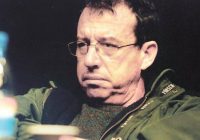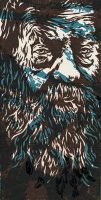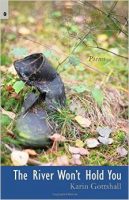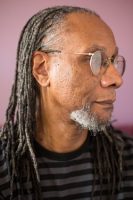December 23, 2014
Edited by David Sanders
Specimen Days
1236 – Philippus Cancellarius, French theologist/poet (Summa Cum Laude), dies
1597 – Martin Opitz, Germany, poet "Father of Modern German Poetry", is born.
1631 – Michael Drayton, English poet (b. 1563),dies.
1646 – François Maynard, French poet (b. 1582), dies.
1743 – Ippolit Bogdanovich, Russian poet (d. 1803), is born.
1819 – Jan Jakob Lodewijk ten Kate, Dutch poet and clergyman (d. 1889), is born.
1828 – Mathilde Wesendonk, German writer/poet (Tagebuchblatter), is born.
1860 – Harriet Monroe, Chicago, poet/editor of Poetry magazine (You & I), is born.
1907 – Manuel Lopes, Cape Verdean writer and poet (d. 2005), is born.
1926 – Robert Bly, US, poet/editor/translator (Loving a Woman in 2 Worlds), is born.

Driving to Town Late to Mail a Letter
It is a cold and snowy night. The main street is deserted.
The only things moving are swirls of snow.
As I lift the mailbox door I feel its cold iron.
There is a privacy I love in this snowy night.
Driving around I will waste more time.
—Robert Bly
There is a privacy I love in this snowy night. / Driving around I will waste more time. —Robert Bly
World Poetry
Poet Yevtushenko Hospitalized in Russia After Fall
Russian poet Yevgeny Yevtushenko, who achieved a rock-star level of fame during the Soviet era, was hospitalized on December 14 after a fall during a visit to the southern Russian city of Rostov-on-Don. The 81-year-old Yevtushenko, who divides his time between the United States and Russia, has arrived in Rostov on December 13 for a reading.
Pak-born Poet Awarded Britain's Queen's Gold Medal for Poetry
Pakistan-born British poet Imtiaz Dharker, whose works include 'The Terrorist at my Table' and 'Over the Moon', has been awarded the prestigious Queen's Gold Medal for Poetry in recognition of her lifetime's contribution to poetry. Queen Elizabeth II will present the prize created in 1933 by George V at the suggestion of the then poet laureate John Masefield to Dharker in Spring 2015, the Buckingham Palace said.
Boğaziçi University Names New Center after Nazım Hikmet
Nazım Hikmet’s legacy will continue to live on at İstanbul’s Boğaziçi University, thanks to the school’s newest research center that is named after the world-renowned 20th-century Turkish poet.
Following Public Outcry, National Lottery Reconsiders Landau Prize to Poet Yitzhak Laor

Mifal Hapayis (the Israel National Lottery) announced Tuesday it has reconsidered awarding the annual Landau Prize for Art and Sciences in the poetry category to Yitzhak Laor. Last month, widespread protests arose on social media against the decision to award the NIS 100,000 prize to Laor due to complaints that over the years he had sexually assaulted numerous women – though he was never investigated nor found guilty of these charges.
Boğaziçi University has named a research center after Nazım Hikmet, the world-renowned 20th-century Turkish poet.
Recent Reviews
David Orr’s 10 Favorite Poetry Books of 2014

by David Orr
When it comes to annual best-books lists, poetry is the cat that wandered into the dog show. No matter how much one tries, as The Times does, to include poets among the various biographers, essayists, novelists and so forth, it’s hard not to feel that poetry is fundamentally different from prose of any stripe. (Prose, said Coleridge, is “words in their best order,” whereas poetry is “the best words in their best order” — but then, Coleridge was a poet.) So here are 10 American poetry collections published in 2014 that I would recommend not only to poetry veterans, but to readers coming to the form with limited experience. In keeping with Times policy, this list includes no friends, lovers, babysitters or college roommates. (If I were allowed to include friends, my list would certainly include Maureen McLane’s “This Blue,” which was a finalist for the National Book Award.) In the interests of spreading the wealth, I’ve also generally favored work by poets I haven’t written about already.
‘Essays After Eighty’ by Donald Hall

by William H. Pritchard
Donald Hall’s career as an outstanding American poet culminated in the 2006 publication of a large selection of his poetry, “White Apples and the Taste of Stone.’’ The volume included, most notably, poems he wrote about the death of his wife, the poet Jane Kenyon, and its aftermath, a memorable testimony to love and loss. But in the title essay to this appealing gathering of 14 short prose pieces, he declares that, as he aged into his eighties (he is now 86), “poetry abandoned me.” In the “ceremony of losses” he calls old age, “[p]rose endures.” This possibly final volume to a life of prose — more than 15 books (not counting his works for children), including a wonderful collection of interviews with modern poets — is instinct with humor and mischievousness.
10 American poetry collections published in 2014 for readers coming to the form with limited experience.
Broadsides
Why Poems Don’t Make Sense*
by Matthew Buckley Smith
“What do people like so much about poems that don’t make any sense?” my wife asked me the other day. It was an honest question. An acquaintance of ours had just published a new poem (that seemed not to make any sense) and some other acquaintances had posted and liked and reposted it on Facebook. We were already familiar with the loose praise that poets—and others—swap online like Confederate money. But since we had a little time on our hands that afternoon, and this latest poem was just so labored and joyless in its presentation of nonsense, we thought it as good an opportunity as any to riddle out exactly why a number of the new poems we were encountering just didn’t seem to make any sense.
Giving Voice, Currency to Old Poems

by Rick Benjamin
Last Sunday, I read at the Jamestown Arts Center with the last two Rhode Island state poet laureates, the deep-hearted Lisa Starr and the deep-hearing Tom Chandler, lucky to be in the company of such good friends in poetry. It’s something the three of us have been trying to do together at least once a month for a while — it turns out we all really like each other, like each other’s work; it turns out that three friends celebrating poetry in public places is a pretty good gig, maybe as good as it gets in this business.
Easy, Durable Dreams: Notes on Poetry and Social Media
by Zach Savich
In June 2014, poet Mathias Svalina promises to operate a Dream Delivery Service. “I will write the dreams, without consultation with the dreamer, & deliver them daily,” Svalina writes. “Each dream is unique to the dreamer/subscriber.” Subscriptions cost $40 if you live within three miles of Svalina’s house, $55 for everyone else.
Dream Delivery Service as social media.
How do you give voice to an old poem?
Drafts & Fragments
The Poetry of Yelp

by Elizabeth Segran
There are, truly, only two types of people in the world: those who write Yelp reviews and those who don’t. With a twinge of guilt, I must confess that I fall into the latter category: I regularly consult Yelp for advice about places to check out in my neighborhood, but I’ve never written a review myself. And yet, as I’ve scanned other people’s posts over the years, I’ve often wondered what compels them to spend hours carefully crafting reviews. Are they more altruistic than I am? Are they more concerned with good service and high-quality food? Do they have more time on their hands?
Titilope Sonuga’s Spoken Word Poetry is Nothing Short of Beautiful! Watch Her TedX Talk Video

Her voice is like a soothing balm over an open wound. Her words are as refreshing as a tall glass of water to a parched tongue. She is Titilope Sonuga – trained engineer and natural poet.
There are, truly, only two types of people in the world: those who write Yelp reviews and those who don’t.
Poetry In the News
James Franco Plays C. K. Williams in a Goulash of a Film, The Color of Time

The Color of Time, a multi-writer, multi-director goulash of a movie inspired by a series of C. K. Williams poems, deserves commendation for its experimentalism if for little else. How many films about living poets are there? Do any of the others star—an incomplete list—James Franco, Zach Braff, Jessica Chastain, and Bruce Campbell? In the poem from which the movie gets its title, Williams writes, “Although it’s quiet now, not a sound, it’s hard—the boy doesn’t know why—not to cry out.” The poem is about domestic restraint, and the terror of close observation—this, it suggests, is a source of poetic impulse.
If These Walls Could Write: Poet Elizabeth Bishop’s N.S. House for Sale
The mother in the story is going mad, and the sign of her madness is a scream in the bedroom. The sound or its echo escapes from the house, and hangs over the village, forever. “Flick the lightning rod on top of the church steeple with your fingernail and you will hear it.” I’m standing in the front room of the house in Nova Scotia where this autobiographical tale first stirred, years before it was born on the page. Across the road is the white church with its high steeple. These things were seen every day, a century ago, by Elizabeth Bishop, the American poet who wrote the story, called In the Village.
Shelby Stephenson Is Next NC Poet Laureate

An award-winning writer from Johnston County is Gov. Pat McCrory's choice as North Carolina's next poet laureate after his original pick departed last summer following criticism from the arts community over the selection process. McCrory announced Monday the appointment of Shelby Stephenson, a retired English professor at the University of North Carolina-Pembroke and former editor of a literary magazine who's published many poetry collections. He's received the North Carolina Award for literature and is North Carolina Literary Hall of Fame inductee.
“The Color of Time” is a multi-director goulash of a movie inspired by a series of C. K. Williams poems.
New Books
The River Won’t Hold You by Karin Gottshall

[Paperback] Ohio State University Press, 74 pp., $16.95
Haunting and haunted, The River Won’t Hold You interrogates loneliness and loss with quiet insistence. In poems fashioned at the difficult intersection of imagination and experience, Karin Gottshall seeks an uneasy solace in the mysterious gaps between them: “I tell myself I can be content with the pleasures / permitted ghosts,” she writes in “Afterlife,” “but my body wakes up / leaking saltwater, and won’t let my ghost-self be.” Poetic structure and the music of language offer a seductive repository for memory, philosophy, and pain. These poems are generous in both their formal approaches and their palettes of sound and silences. But Gottshall never settles for an easy or artificial solution to the questions her poems ask; the beauty of her work comes, instead, from the directness of her gaze and the images that gaze fixes itself upon: “Wide-open, staring eyes of the tiger / I drew and had to destroy because it wouldn’t sleep.”
The Heights of Macchu Picchu by Pablo Neruda

[Paperback] Copper Canyon Press, 64 pp., $15.00
"The Heights of Machu Picchu" has been called Pablo Neruda's greatest contribution to poetry—a search for the "indestructible, imperishable life" in all things. Inspired by his journey to the ancient ruins, Neruda calls the lost Incan civilization to "rise up and be born," and also empowers the people of his time. This new translation by poet Tomás Q. Morín includes an introduction by Morín and Neruda's Spanish original.
The Necropastoral: Poetry, Media, Occults by Joyelle McSweeney
[Paperback] University of Michigan Press, 216 pp., $32.95
In The Necropastoral: Poetry, Media, Occults, poet Joyelle McSweeney presents an ecopoetics and a theory of Art that reflect such biological principles as degradation, proliferation, contamination, and decay. In these ambitious, bustling essays, McSweeney resituates poetry as a medium amid media; hosts “strange meetings” of authors, texts, and artworks across the boundaries of genre, period, and nation; and examines such epiphenomena as translation, anachronism, and violence. Through readings of artists as diverse as Wilfred Owen, Andy Warhol, Harryette Mullen, Roberto Bolaño, Aimé Césaire, and Georges Bataille, The Necropastoral shows by what strategies Art persists amid lethal conditions as a spectacular, uncanny force.
“The River Won’t Hold You” by Karin Gottshall interrogates loneliness and loss with quiet insistence.
Correspondences
Wendy Cope: ‘My secret love is Strictly Come Dancing’

by Alex Clark
Word of mouth is the most important thing that sells books, but you need a few mouths to get the words going. I was 40 when I was first published. I was a single, somewhat lonely, primary school teacher, and suddenly the phone never stopped ringing. It was quite a surprise.
Is There a Vespa?: An Interview with Michael Hofmann
by Jack Livings
Michael Hofmann’s first collection of poems, Nights in the Iron Hotel, came in 1984, and in the ensuing thirty years he has translated more than sixty novels from the German and published five more poetry collections, along the way collecting numerous prizes for his work. He is the editor of an anthology, Twentieth-Century German Poetry, and in 2002 published a collection of critical essays, Behind the Lines. (This is far from a comprehensive accounting.) The thirty essays in his new collection, Where Have You Been?, visit a range of poets, novelists, and artists of the last hundred years, including Elizabeth Bishop, Robert Lowell, Thomas Bernhard, Kurt Schwitters, and Frederick Seidel.
Nathaniel Mackey Discusses the Relationship between Athletics and Poetry

by Chris Vitiello
This week, we published a profile of Duke professor Nathaniel Mackey, one of the leading experimental lyric poets in the country, if not he world. We couldn’t fit in the following fascinating thoughts from Mackey on how the athletic activities of his school years may or may not influence his poetry, so we wanted to share them below.
Word of mouth is the most important thing that sells books, but you need a few mouths to get the words going.
Envoi: Editor’s Notes
"Hearing a poem, as opposed to reading it on the page, means you miss so much — the shape, the punctuation, the italics, even knowing how far you are from the end. Reading it on the page means you can go your own pace, taking it in properly; hearing it means you're dragged along at the speaker's own rate, missing things, not taking it in, confusing 'there' and 'their' and things like that. And the speaker may interpose his own personality between you and the poem, for better or worse. For that matter, so may the audience. . . . When you write a poem, you put everything into it that's needed: the reader should 'hear' it just as clearly as if you were in the room saying it to him. And of course this fashion for poetry readings has led to a kind of poetry that you can understand first go: easy rhythms, easy emotions, easy syntax. I don't think it stands up on the page."
—Philip Larkin, "An Interview with Paris Review" (1982), in Required Writing: Miscellaneous Pieces 1955-1982 (Faber and Faber 1982).
Larkin is correct in recognizing that a poem is both spatial and temporal. But in its conventional spatial setting (the page) it resembles a musical score; more often than not, it is meant to be heard. That can certainly be done in the quiet of one's head, but to actually hear the sounds out loud brings it to a kind of life; it becomes that mimicry of human speech it is designed to be. While you might miss nuances of the language and line breaks, if the poem is attuned to oral presentation and the reader is up to the task, the reading can be a rewarding–if different–experience, at least equal to the experience of encountering it in the silence of the page. Having said that, I admit to being to numerous readings where neither the poem nor the reader was up to the task, and recall one particularly painful event when the poet let it be known that she would gladly re-read any poem at the show of a hand, which prompted some demon in the audience to raise a hand after every poem recited. Reason enough to sit near the back.
But I do think his last point, that the proliferation of poetry readings has changed poetry, has validity. The gag poem, the poem that relies on sonorous intonation or gesture, the poem that flies by in a swarm of rhymes or wordplay, all have overtaken the measured and complex sentences that let the poem slowly reveal its course through its own seemingly meandering logic and narrative. I don't think it has to be a choice between either one sort of poem or the other, however. The careful reader and the sensitive listener can, given the right poem, inhabit the same body and find the same sense of the poem's fulfillment.
“Hearing a poem, as opposed to reading it on the page, means you miss so much.” —Philip Larkin
